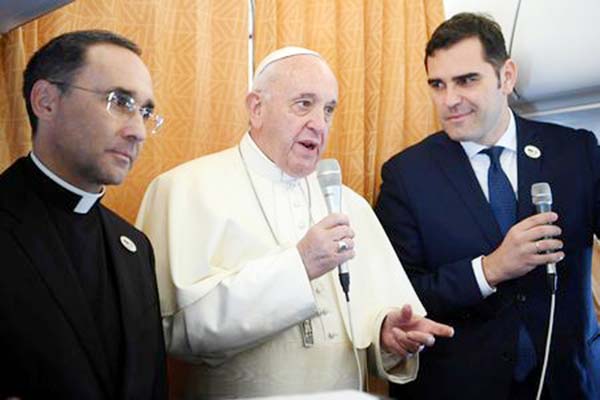
AP, Bulgaria:
Pope Francis urged Bulgarians on Sunday to open their hearts and homes to migrants, arguing that a country like Bulgaria, which is losing so much of its population to emigration, should well understand the forces that drive people to leave their native lands.
As he arrived in the Balkan nation for a two-day visit, Francis “respectfully suggested” that Bulgarians recognize that migrants are fleeing war, conflict or dire poverty “to find new opportunities in life or simply a safe refuge.”
“To all Bulgarians, who are familiar with the drama of emigration, I respectfully suggest that you not close your eyes, your hearts or your hands – in accordance with your best tradition – to those who knock at your door,” he told government officials at the presidential palace in Sofia, the capital.
Bulgaria’s center-right, pro-Brussels coalition government includes three nationalist, anti-migrant parties. The government has called for the European Union to close its borders to migrants and has sealed off its own border to Turkey with a barbed-wire fence.
But the country is also losing its population at a faster clip than any other nation, according to the U.N. Bulgaria’s current 7 million people are expected to dwindle to 5.4 million by 2050 and to 3.9 million by the end of the century.
The Argentine pope has made the plight of migrants and refugees a hallmark of his papacy, urging governments to build bridges, not walls, and to do what they can to welcome and integrate refugees. His visit falls just three weeks before the European Parliament elections across the EU’s 28 nations in which nationalist, anti-migrant parties are expected to make a solid showing.
On Monday, Francis will visit a refugee center in a former school on the outskirts of Sofia. Radostina Belcheva of the Council of Refugee Women in Bulgaria said Francis’ visit will show solidarity with those in need.
“But really, their whole acceptance is a matter for each of us and for our society,” Belcheva told The Associated Press.
Bulgaria’s tough stance on refugees has been a deterrent: while some 20,000 people applied for asylum in Bulgaria in 2015, that number dwindled to 2,500 last year, according to the state refugee agency.
From an economic standpoint, however, the EU’s poorest nation may need more immigration to stabilize its future. Bulgaria has the EU’s highest mortality rate and one of the bloc’s lowest birth rates. That, combined with tens of thousands of workers leaving the country annually to find better-paying jobs, poses serious problems for funding the country’s pension system.
Bulgaria has the EU’s lowest average monthly salary – 575 euros ($645) – and its smallest average monthly pension, at 190 euros ($213).
In his speech Sunday, Francis urged the government to continue working to reverse this “new demographic winter,” saying the phenomenon had “descended like a curtain of ice on a large part of Europe, the consequence of a diminished confidence in the future.”
He urged Bulgaria to “strive to create conditions that lead young people to invest their youthful energies and plan their future, as individuals and families, knowing that in their homeland they can have the possibility of leading a dignified life.”
Later Sunday, Francis met with the leader of the Bulgarian Orthodox Church, Patriarch Neofit, during a visit to the headquarters of the Holy Synod, the church’s governing body.
The conservative Bulgarian church doesn’t participate in official Catholic-Orthodox dialogue and even snubbed a pan-Orthodox council in Crete in 2016. The Holy Synod has made clear that it will not take part in any joint services or prayers with the pope, although a children’s choir is expected to sing for him.
Francis sought to encourage greater paths of dialogue in his remarks to Neofit, a reflection of the Vatican’s longstanding efforts to heal the 1,000-year schism that split Christianity. Francis lamented the “wounds” of division and “fraternal nostalgia” of being unified.
But Neofit held firm in his speech, saying that the Bulgarian Orthodox Church would remain the keepers of true Christianity:
“We are firmly convinced that for all that concerns the faith, there cannot and must not be any compromises,” he told Francis.

